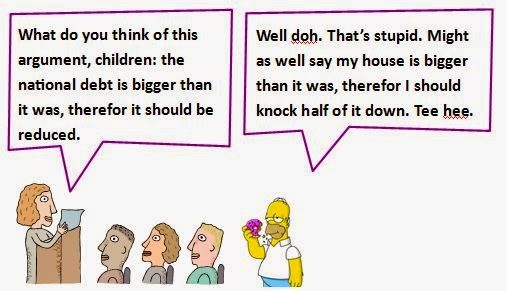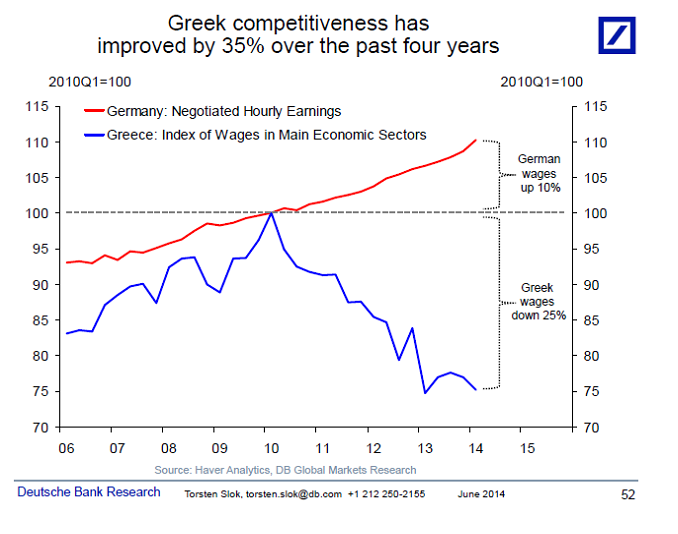RALPHONOMICS What s the optimum amount of national debt
Post on: 4 Июнь, 2015 No Comment

Thursday, 5 March 2015
Whats the optimum amount of national debt?
Ill argue below that the optimum amount is none. And for those interested in science, theres something appealing about simple answers to complex questions. E=MC2 was an example of that sort of simple answer. Moreover, Milton Friedman and Warren Mosler also argued for zero debt, so Im in reasonably good company. (Re Friedman see para starting Under the proposal.. and for Mosler, see his 2nd last para). Anyway, down to business.
National debts have risen over the last five years or so as a result of dealing with the recession. The standard and not very clever response from most economists is approximately as follows.
The word debt has negative overtones, so debt must be bad. Plus we obviously need to reduce the extent of anything bad. Ergo the debt should be reduced to about where it was prior to the recession Indeed thats been pretty much the response of the IMF and OECD except that they refer to debt reduction with a technical sounding phrase to make themselves sound important: they refer to fiscal consolidation.
Well the fact that some countrys national debt used to be say 50% of GDP and then rises to 75% is not a reason to return to 50%. The important question is: whats the OPTIMUM amount of debt? The new post recession optimum could be 10%, or it might be 70%. Who knows?
As Ive pointed out several times before, the concept optimum seems to be beyond the comprehension of almost every economics commentator including economics professors at the worlds top universities (no names mentioned). Makes you wonder whats inside their skulls: brain cells or something else.
Anyway, four plausible but actually flawed arguments for government borrowing are considered below. Theyre as follows.
1. Government should borrow to fund public investments like infrastructure.
2. Borrowing makes it possible to spread the cost of public investments across generations.
3. Letting those with cash to spare lend to government is a good idea.
4. Borrowing provides government with money with which to implement stimulus.
1. Borrowing for infrastructure.
Its often argued that governments should borrow to fund infrastructure and similar investments, whereas TAX should be used to fund CURRENT spending. And that sounds sensible: after all, households and firms often borrow to fund investments, like buying a house, factory or office block.
However, the idea that investments should ALWAYS be funded by borrowing is nonsense: theres no point whatever in borrowing if you happen to have more than enough cash to spare. No one in their right mind borrows to buy a car if theyve more than enough cash lying idle. And governments have a near inexhaustible supply of cash, namely the taxpayer.
Of course politicians are often RELUCTANT to raise taxes to fund investments. Reason is that politicians can normally ingratiate themselves with voters by cutting taxes, increasing borrowing and leaving it to some poor sucker in ten years time to sort out the resulting debt. Or as David Hume put it 250 years ago:
It is very tempting to a minister to employ such an expedient, as enables him to make a great figure during his administration, without overburdening the people with taxes, or exciting any immediate clamours against himself. The practice, therefore, of contracting debt will almost infallibly be abused, in every government. It would scarcely be more imprudent to give a prodigal son a credit in every banker’s shop in London, than to impower a statesman to draw bills, in this manner, upon posterity.
But the fact remains that governments have a near inexhaustible supply of cash: the taxpayer. Thus the excuse for borrowing, namely that I dont have enough cash just wont wash in the case of governments.
2. Spreading the burden across generations.
A second plausible reason for borrowing is that since the benefit of a long term investment is enjoyed by more than one generation, each generation should carry some of the cost, and that can be done by making people in fifty or a hundred years time responsible for some interest and repayment of some of the capital sum. (This argument takes some time to dispose of you have been warned!)
The basic problem with the later generation argument, is that it involves time travel: that is, it assumes for example, that people in 2050 can make a real sacrifice and for example produce steel and concrete to help build a bridge which is put up in 2015. Thats clearly impossible: it involves time travel.
Put another way, if government in 2015 borrows $X to build a bridge, then all the person hours and other real resources needed to build the bridge have to be produced and consumed in 2015 (or earlier). As to the bonds issued by government in respect of the bridge, those are purchased by one set of people who pass them on to their descendants, plus another set of people inherit the liability to pay taxes to fund the interest and repayment of capital on those bonds. Thus on balance, the next generation makes no net sacrifice.
Foreign debt.
There are two apparent flaws in the above time travel argument. The first is that where debt is held by foreigners, thats a genuine debt for the country as a whole. I.e. it really is possible to borrow from foreigners so as to fund a bridge built in 2015. Then in 2050 or whatever comes payback time, and the country has to make a real sacrifice to pay back those foreigners.
However, against that foreigner point, theres the fact that national debt of country X held by people in country Y will to some extent be cancelled out by national debt of country Y held by people in country X. Also, the amount owed to foreigners (e.g. by the US to China) is determined by factors TOTALLY UNRELATED to how much infrastructure investment the US is doing. Thus the whole foreigner point is pretty irrelevant.
The Nick Rowe theory.
Another weakness in the above time travel argument (put by Nick Rowe ) and which doesnt in fact stand inspection is as follows.
Rowe argued that the bonds issued by government at one point in time can be sold by bond owners in their retirement to younger working people. And the latter can in their retirement sell to the next generation, and so on. That way one can pass the cost of government spending down the generations.
The flaw in that argument is that different generations actually engage in the latter sort of passing the buck activity ANYWAY as part of pension provision.
Pensions can be funded or unfunded. The former involves saving up and investing in assets, like government bonds. In contrast, an UNDFUNDED pension scheme invests in nothing: youngsters at any given point in time simply pay taxes or make a payment in some other way which is passed straight to pensioners living at the same time.
Now on the very reasonable assumption that people ALREADY HAVE the pension provision that they want, theyre not going to want EVEN MORE pension provision just because government builds a series of bridges and highways.
Thus I suggest the Nick Rowe theory doesnt dent the basic argument Im putting here, which is that the spreading the burden across generations argument does not stand up.
3. Why not let people lend to government if they want to?

A third plausible argument for government borrowing is thus. If people (particularly those with cash to spare) want to lend to government, why not let them?
Well the problem with that argument is as follows.
The basic point of the tax and borrowing that funds public spending is to supress PRIVATE spending. That is, assuming the economy is at capacity, if government is going to spend $Xbn more, then the private sector must spend $Xbn less, otherwise we get excess spending and excess inflation.
Now the idea that because Xbn of extra tax is extracted from the private sector, that therefor the private sector will spend $Xbn less, is a gross over-simplification. What the private sector will do is certainly to spend SOMEWHAT less, but it wont cut its spending by as much as $Xbn.
And in the case of borrowing, the relationship between borrowing and subsequent cuts in spending by the private sector is even more feeble. In particular, if private sector entities lend to government because they have money to spare, money theyd have left idle in the event of not lending it to government, then the cut in private spending that results from that money being loaned to government will be near non-existent.
(Incidentally, you should have noticed that lending to government (macroeconomics) is very different to lending to a microeconomic entity like a household or firm. In the case of the latter two its simply a case of getting hold of the right amount of cash. In the case of lending to government, its a case of SUPRESSING private spending by the right amount)
4. Borrow to fund stimulus.
As Keynes pointed out, governments can escape recessions by spending EITHER printed money OR borrowed money. So which is best?
Well Im darned if I can see the point of BORROWING. The purpose of stimulus is to increase demand. But borrowing has a deflationary or demand reducing effect. So borrowing in order to obtain the money to implement stimulus is a bit like throwing dirt over your car before washing it.
John Cochrane (professor of economics at Chicago) pointed to the problems involved in borrowing money in order to effect stimulus. Cochrane went too far in suggesting that borrowing COMPLETELY negates the desired stimulatory effect. But even so, and to repeat, doing something anti-stimulatory when youre trying to implement stimulus is a strange thing to do.
Conclusion.
I probably havent TOTALLY DEMOLISHED the case for government borrowing above, but Ive thrown plenty of cold water over the idea.
So my provisional conclusion is that governments ought to aim at borrowing nothing. Put another way, Milton Friedman was right to say that the only liability issued by the government / central bank machine should be boring old cash, or base money.
But thats not to say that there will NEVER be a case for some borrowing. For example if theres a serious outbreak of Greenspans irrational exuberance and inflation looks like rising too far and it looks like fiscal measures wont rein in the exuberance, thered be no harm in government or central bank wading into the market and offering to borrow money at above the going rate of interest, and raising taxes so as to pay for that interest.
But note that that is not borrowing in the normal sense of the word. Borrowing in the normal sense of the word (e.g. borrowing in order to fund the construction of a house) involves the LOAN or TRANSFER of real resources from the lender to the borrower. In contrast, in the case of the above anti irrational exuberance so called borrowing, there is no transfer of real resources. All that happens is that TOKENS commonly known as money are removed from private sector pockets so as to cut down on private sector consumption.
So all in all, the case for government borrowing in the normal sense of the word borrow looks very feeble. Looks like David Hume was right 250 years ago: the REAL motive for government borrowing is that it enables politicians to ingratiate themselves with voters.














